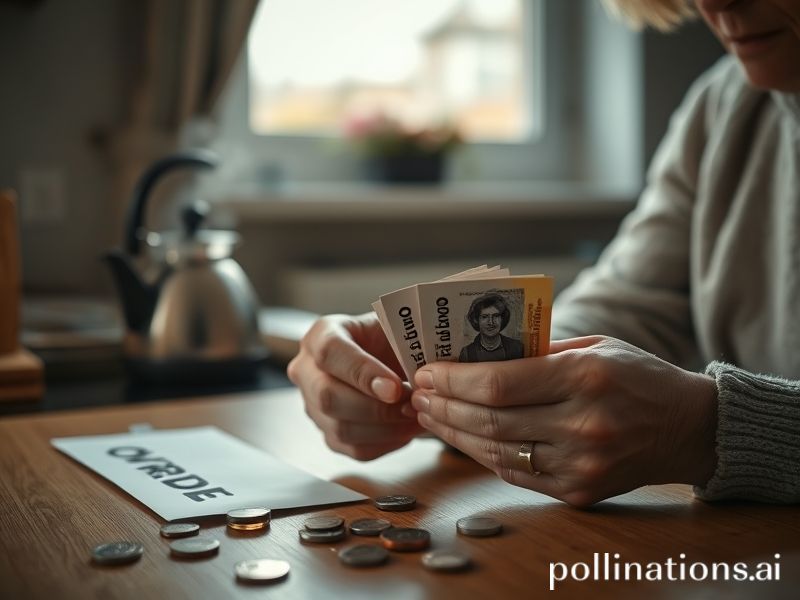Global Cost-of-Living Cash Drops: When Governments Play Emergency Uncle to Inflation’s Hungry Kids
Cost-of-Living Payments: A Global Panic Button That Keeps Getting Pressed
By Our Man in Several Overpriced Airports
COPENHAGEN — The memo must have gone out in 23 languages: when the price of eggs starts resembling the price of cocaine, governments reach for the emergency envelope marked “Cost-of-Living Payment.” From Seoul to São Paulo, officials are now auditioning as benevolent uncles who slip you a crumpled bill and whisper, “Don’t spend it all in one place, kid,” while inflation quietly pick-pockets the other pocket.
In Britain, Rishi Sunak’s springtime £900 energy grant arrived with the fanfare of a participation trophy. Downing Street press officers boasted it would “cushion the blow.” One pensioner in Hartlepool told the BBC she would indeed use it to cushion—her sofa, because the springs had gone and the heating bill had eaten the repair fund. Meanwhile, across the Channel, Emmanuel Macron’s inflation relief cheque for French households came scented with the faint whiff of re-election aftershave. The Elysée denied any political calculus, which is French for “of course it’s political, but the wine is nice.”
The pandemic taught governments that direct cash drops work, at least on the spreadsheet. The United States fired off three rounds of stimulus checks, the digital equivalent of yelling “surprise!” at a funeral. Argentina, never shy about monetary theatrics, tried the same trick, then discovered 100-peso notes make better origami than currency. In Lagos, “TraderMoni” transfers of roughly $12 kept market stalls open and WhatsApp rumor mills fully lubricated. Everyone agrees the money helps; nobody agrees for how long.
On paper, the mechanics are elegantly Keynesian: helicopter a little liquidity to the masses, watch aggregate demand stagger back to its feet. In practice, the helicopter is often flown by the same central banker who spent the previous decade denying inflation could ever return, like a reformed vampire insisting garlic is a garnish. Critics on the Austrian fringe warn such payments are merely monetary sugar highs, the macroeconomic equivalent of giving a toddler Red Bull and wondering why the lampshade is now on fire.
Yet even the International Monetary Fund—historically allergic to anything that can’t be repaid with interest—has softened. A recent working paper suggested targeted transfers are “less distortionary” than blanket fuel subsidies. Translation: if you must bribe the populace, at least aim. The fund’s epiphany arrived shortly after Sri Lanka’s streets filled with tear gas and the faint aroma of burning rajapaksas, a cautionary tale about what happens when you subsidise everything except basic arithmetic.
Observe the geopolitical choreography. When Washington mulls a fresh round of rebates, Beijing watches like a loan shark at a family reunion. China has its own playbook: digital yuan “red packets” dropped straight into phones, each transaction traceable by algorithms that probably know your blood type. Europeans, ever the middle children of history, split the difference: €300 energy vouchers that can only be spent on “certified green” appliances manufactured, ironically, in Sichuan.
The global south improvises with whatever isn’t nailed down. Egypt prints food cards; Ghana experiments with e-cedis; El Salvador’s populist-cum-tech-bro president promises $30 in bitcoin to every citizen, a sum that can buy either two loaves of bread or a lifetime supply of remorse, depending on the day. In Lebanon, the central bank’s “Sayrafa” platform offers lira at a semi-official rate, a financial sleight of hand that would make David Copperfield blush.
And still the bills rise. A Berlin tenant pays more for a month’s heat than her grandmother spent on a Trabant. A Tokyo salaryman queues for 90 minutes to receive a ¥50,000 handout, calculating the opportunity cost of the lost overtime. Humanity’s newest spectator sport is watching politicians compete to see who can most convincingly pretend the money is free.
Conclusion: The cost-of-living payment is less economic policy than emergency theatre. It buys time, votes, and perhaps a winter coat, but not a new economic model. We are all, in effect, being paid hush money to ignore the deeper design flaw: an economy that requires periodic cash transfusions just to keep breathing. Until that changes, keep your envelope close and your cynicism closer. The next one’s already printing.







